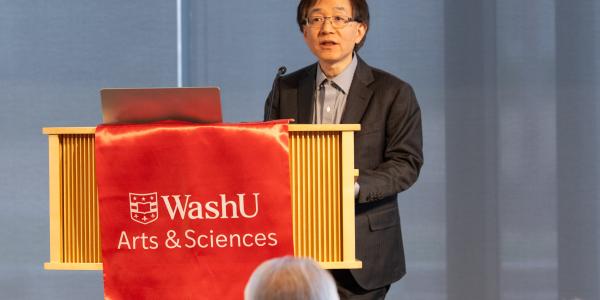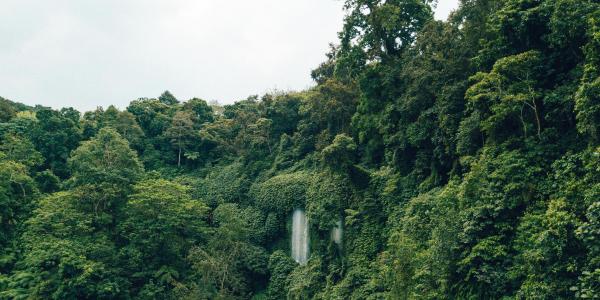Bill Wells, PhD ’70, draws on a lifetime of research, mentorship, and community service to support the next generation of WashU physicists.


Bill Wells, PhD ’70, felt a little out of place standing in a Chrysler plant on the outskirts of Detroit. The astrophysicist had helped plan space missions with NASA. He’d sent experimental research equipment into the stratosphere to study cosmic rays. And now, here he was in the mid-1970s, his focus fixed firmly on Earth, helping the Army design a modern tank.
“They might not seem connected, but to make a tank that can withstand certain kinds of blasts, you need to know a lot of physics,” Wells said. “You have to know how all the materials interact with charged particles to know if the people and equipment will survive when it counts.”
Almost two decades later, after the first Gulf War, President George H.W. Bush invited troops to an event on the National Mall, including many who owed their lives to those tanks. Wells showed up too, to visit with them.
“I spent an afternoon talking to every tank crew there,” he said. “I knew how the system was supposed to work, but hearing from these guys about how it actually worked, that was really something. You rarely get time in your life like that, to feel good about what you’ve done.”
Today, the chance to make an impact continues to inspire Wells — this time, through philanthropic gifts to Arts & Sciences. Wells and his wife, Ginny, have made a significant estate commitment to endow the William and Virginia Wells Professorship in Physics, which will help the Department of Physics recruit and retain exceptional faculty members and support the recipients’ teaching and research.
Wells, now retired after a long career with the Illinois Institute of Technology Research Institute and Science Applications International Corporation, grew up in a farmhouse in upstate New York, where his father’s generation attended classes in a one-room schoolhouse.
Wells took a school bus to the nearest city to attend elementary and high school before earning a physics degree on a partial scholarship at Union College in nearby Schenectady, New York. He applied to WashU on the recommendation of his senior thesis advisor, Winfred Schwarz, BA ’36, PhD ’38. At a church dinner for college students his senior year, he met Ginny, who had earned a master’s degree in library science. They married in 1966 and settled in the St. Louis area. Ginny became a librarian at Fontbonne College and Bill rode his bike from their Clayton apartment to WashU to pursue his doctorate in physics.

That’s where he met and worked with the late Michael Friedlander, professor emeritus of physics in Arts & Sciences and cosmic ray researcher who oversaw WashU’s Crow Observatory for many decades. Friedlander, who died in 2021, was Wells’ thesis adviser and one of the original members of the McDonnell Center for the Space Sciences.
“He had a certain integrity that I really respected, not just in how careful he was with his research, but also on larger, social issues,” Wells said of Friedlander, who advocated for the above-ground Nuclear Test Ban Treaty of 1963, which prohibited nuclear weapons testing in the atmosphere, in outer space, and under water.
To honor his longtime mentor, Wells established the Michael Friedlander Fellowship in 2018 for a graduate student in the Department of Physics.
“A teaching fellowship helped me get through my graduate education, and it’s one thing we can do to help more people get the best education possible,” said Wells, who has maintained strong ties to the Department of Physics over the years and attended the physics reunion on the Danforth Campus earlier this year.
Wells describes his retired life as engaged and meaningful. Along with spending time with his family, he volunteers to help seniors with tax returns, supports a mission in Guatemala, and runs a peer-to-peer support service at his Methodist church. He credits his experiences in Arts & Sciences for contributing to his community-focused mindset.
“When I was a graduate student, WashU had a program where the YMCA would take us out to spend the afternoons with kids in Kinloch, Missouri, northwest of St. Louis,” he said. “We’d do homework together sometimes, but a lot of it was just getting outside and having fun with the kids. Sometimes the things that happen outside the classroom can shape you most.”
Philanthropy doesn’t have to involve large sums or grand gestures, Wells said. “You don’t have to be a physicist to know we’re all part of something much bigger than ourselves,” he said. “We can all create change in our own small ways. That’s the true gift.”
The William and Virginia Wells Professorship in Physics supports With You: The WashU Campaign, a fundraising effort dedicated to creating a more promising future for all.




